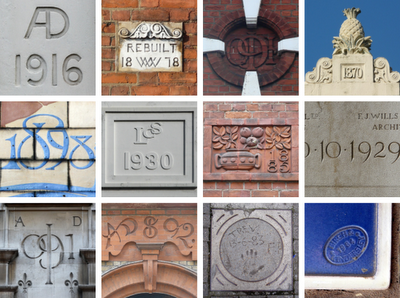Let me explain... Often, whilst watching a TV programme or reading a book, I see/hear a sentence akin to "the mid-1800s was a busy time for industry" so I expect to hear about the late Georgian innovations, the Regent's Canal, etc. But then they start talking about the railways and the Great Exhibition and I realize they mean the middle of the 19th century, the mid-1850s, the Victorian era.
Similarly, "in the late 1600s" is really confusing – this could now have two meanings. It could be alluding to either the first or the last decade of that century! It's extremely frustrating and confusing, and creates a situation where information might be incorrectly shared because the terminology is vague. I have even heard presenters on TV programmes using both styles within a five minute timeframe. Eh? What? When?!

Dates stamps on buildings, from the 1800s 1900s (ha ha). This collection of images originally appeared in Dec 2011
However, whilst this new cover-all century-wide style seems to be becoming commonplace when referring to the dim distant past, I notice it is not being applied to recent history. A comparison I use to try to put a halt this silliness, is to point out to my contemporaries that we must have all been born in the 1900s (er, the Edwardian era)!
Oh, and don't get me started about the insertion of rogue apostrophes/possessives such as "Jane was born in the 1960's. No no no!!! To clarify: the 1960s is an era (plural), Jane is wearing a 1960's dress (of that era/possessive). I hope that helps, ha ha.*perhaps this is for people who also cannot read a map, who don't understand where north is and how once you know that and have established a simple point of reference the rest is easy.
